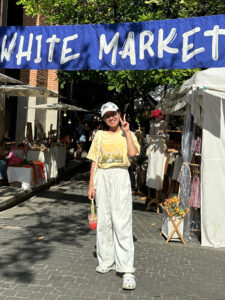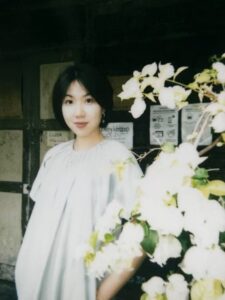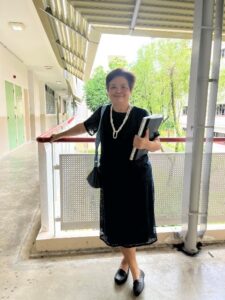
Why pursue graduate study in
Southeast Asian Studies?
The Department of Southeast Asian Studies offers graduate programmes that adopt an inter-disciplinary approach to learning, drawing on different perspectives and methodologies from the humanities and social sciences, all thoroughly informed by local experience and knowledge.
Our Masters by Coursework programme is a graduate degree option designed for post-graduate students from a wide range of academic areas who wish to acquire a deep understanding of contemporary Southeast Asia and for working professionals who wish to enrich their careers through the pursuit of an advanced degree. Students are exposed to a variety of scholarly perspectives that will give them a more focused understanding of Southeast Asia’s political economy, natural environment, and cultural landscapes. As the region rises in global importance, the programme aspires to nurture students capable of not only understanding the profound changes underway in the region in a sophisticated and integrated manner, but also of potentially leading these changes.
The Master of Arts (MA) and Doctor of Philosophy (PhD) research programmes provide postgraduate training for individuals who will contribute to knowledge production in and about Southeast Asia. Students will be taught by highly rated staff whose expertise lies in fields ranging from history, economics and political science to anthropology, cultural studies and archaeology. Our inter-disciplinary structure exposes students to the latest theoretical and methodological issues while also ensuring deep immersion in regional specificities. Graduates are prepared for academic careers and employment in research intensive professions with working knowledge of Southeast Asian languages.

The Department of Southeast Asian Studies offers BA, BA (Hons), MA by coursework, MA by research and PhD degrees, awarded by one of the world’s top-ranking academic institutions. It is is unique for a number of reasons, including:
(a) our location within the region, facilitating easy field trips and primary research;
(b) a genuinely inter-disciplinary approach to scholarship that is grounded in theory and sensitive to local contexts;
(c) faculty specialisations that include cultural studies, politics, visual culture, social history, heritage studies, science, technology and society, environmental and development studies, migration, performing arts, religion, and more;
(d) small classes, permitting close interactions between faculty and students;
(e) an international community of graduate students;
(e) belonging to a Faculty that has one of the largest concentrations of scholars of Asia anywhere in the world; and
(f) excellent library and archival collections.
We welcome you to explore the many facets of student life, faculty expertise, and the various exciting programmes on offer at our department.
Programmes & Curriculum
About the Programme
This programme aspires to nurture students capable of not only understanding the profound changes underway in the region, but also of potentially leading these changes. Graduates of the one-year MA in Contemporary Southeast Asia will be able to engage with ongoing global issues about the region, equipped with robust knowledge, sharp analytical skills and well-honed cross-cultural competencies.
- The NUS Faculty of Arts and Social Sciences (FASS) boasts the highest concentration of Southeast Asia specialists in the world.
- Students will be taught by the Department’s first-rate scholars in the social sciences and humanities. Keeping abreast of Southeast Asia’s latest developments, they conduct fieldwork and archival research across the region – from Thailand to Timor-Leste.
- Students will live and study in Singapore, a hub in Southeast Asia that presents a wealth of regional and international networking opportunities.
Programme Structure
Students will gain integrated, interdisciplinary insights into Southeast Asia.
All students will read two core courses, covering:
- The history, economics, and politics of the region
- The region’s diverse social, religious and cultural landscapes
In addition, students will choose courses from three thematic concentrations, which offer relevant lenses through which to analyse the challenges of our times:
- Natural Environment: Environment, land, and development
- Cultural Landscapes: Heritage, visual arts, and culture
- Political Economy: Technology, urban issues and the economy
Students’ learning is solidly grounded in theory and experiential learning, via:
- Country-specific seminar classes providing in-depth exposure to a single Southeast Asian country
- Masterclasses and field trips that invite students to gain new skills and learn about the region through immersion and practice
- A thesis, either in written format or hybrid form (for example, combining a documentary film and a written essay) offering students the opportunity to pursue their interest in depth.
To be awarded the MA in Contemporary Southeast Asia, students must complete a total of 40 units.
For more information, please visit here.
About the Programme
The research Master of Arts (MA) programme is primarily intended to develop scholars and academics who can contribute, through undertaking original research, to our knowledge and understanding of the Southeast Asian region. We aim to produce future researchers and academics who will be conversant with prevailing epistemological, theoretical, and methodological issues in their specific fields of study and who can contribute to better understandings of key questions of scholarship and policy on Southeast Asia. The research thrusts of the programme ultimately reflect the expertise and visions of the Department's academic staff.
Students can enrol into the programme either on a full-time or part-time basis:
- International students on student visa must be enrolled full-time
- Admission as a part-time student is at the discretion of the Department
Programme Structure (applicable to Cohort 2023 onwards)
A student will be recommended for award of degree if he/she has met the following requirements:
- Completed and passed at least four (4) courses or 16 units, unless exemption has been granted by the University, which include:
-
- One (1) required course: SE6770 Graduate Research Seminar (4 units)
- Three (3) elective courses, of which:
- A maximum of one (1) course (equivalent to 4 units) may be at level 4000
- The remaining courses must be at level 5000 or 6000
Optional: Up to two (2) Independent Study courses - SE5660 and/or SE6660
- Obtained a minimum Grade Point Average (GPA) of 3.00;
- Passed the MA thesis;
- Where applicable, obtained at least grade 'C' in Graduate English Course(s);
- Other departmental requirements, if any
For more information, please visit here.
About the Programme
The research Doctor of Philosophy (PhD) programme is primarily intended to develop scholars and academics who can contribute, through undertaking original research, to our knowledge and understanding of the Southeast Asian region. We aim to produce future researchers and academics who will be conversant with prevailing epistemological, theoretical, and methodological issues in their specific fields of study and who can contribute to better understandings of key questions of scholarship and policy on Southeast Asia. The research thrusts of the programme ultimately reflect the expertise and visions of the Department's academic staff.
Programme Structure
A student will be recommended for award of degree if he/she has met the following requirements:
- Completed and passed at least six (6) courses or 24 units, unless exemption has been granted by the University, which include:
-
- One (1) required course: SE6770 Graduate Research Seminar (4 units)
- Five (5) elective courses, of which:
- A minimum of three (3) courses (equivalent to 12 units) must be at level 6000
- A maximum of one (1) course (equivalent to 4 units) may be at level 4000
- The remaining courses must be at level 5000 or 6000
Optional: Up to two (2) Independent Study courses - SE5660 and/or SE6660
- Obtained a minimum Grade Point Average (GPA) of 3.50;
- Passed the PhD Qualifying Examination (QE);
- Passed the PhD thesis;
- Passed the PhD Oral Examination;
- Completed and passed NG5001 Academic Communication for Postgraduate Researchers;
- Where applicable, obtained at least grade 'C' in Graduate English Course(s);
- Other departmental requirements, if any
For more information, please visit here.
Job Ready
With the advantage of being familiar with Southeast Asia and the ability to communicate in a Southeast Asian language, graduates are empowered to seek job opportunities in a wide variety of jobs in the private and public sectors. Both local and multinational corporations based in Singapore with interests in Southeast Asia find that our graduates function effectively with a strong understanding of the region.
Our graduates build successful and exciting careers in statutory boards and government ministries, business and tourism, journalism and other media, teaching, research, academia, public relations, finance and market research, museums, cultural centres, arts festivals, arts councils, diplomatic work and international organisations (e.g. aid agencies, NGOs and philanthropic foundations).
Testimonials

Ms Xie Mulan
MA in Contemporary Southeast Asia '25
What I loved most about the programme was the interaction with people – whether it was the professors’ insightful responses during seminars or the discussions with classmates from multicultural backgrounds. These intellectual collisions not only deepened my understanding of the region’s complexities but also challenged me to think critically in both my studies and life. The programme also offered unforgettable hands-on learning experiences. From the Gamelan masterclass, where I experienced Javanese culture through music, to the Johor field trip, where I immersed myself in the local communities’ cultural and social nuances, these activities brought Southeast Asia’s vibrancy to life.
Ms Song Yang
MA in Contemporary Southeast Asia '26
This programme has truly opened the door to my interest and enthusiasm in understanding the politics and culture of Southeast Asia. What surprised me most was the entire department's support network to help students inspire their academic potential. Professors' unrestrained support and their patient, hands-on guidance were of the greatest help to me. Their guidance taught me how to transform disorganised ideas into concrete and meaningful research topics and how to then conduct solid empirical research.


Ms Frances Ong Hock Lin
MA in Contemporary Southeast Asia '26
One of the most enriching experiences of the programme was taking SEA5238 Country Studies: Singapore. Some of my friends questioned why I chose to study my own country, but this module provided a new lens through which to examine Singapore’s historical development, governance, and cultural and social evolution. It challenged many of the assumptions I had taken for granted and allowed me to explore lesser-known aspects of Singaporean society. The diversity of perspectives in the class, with students from different academic and professional backgrounds and from various countries in Southeast Asia, made for stimulating debates and deepened our collective understanding of contemporary issues in Singapore. What truly made the experience exceptional was the engaging teaching approach. Our lecturer infused lessons with real-life stories that brought abstract concepts to life, allowing us to appreciate how historical events and policies continue to shape Singapore today. This storytelling approach added a human dimension to our studies and reinforced the relevance of academic knowledge in real-world contexts.
The Faculty of Arts and Social Sciences, National University of Singapore (NUS) is committed to environmental sustainability.
This e-brochure is part of our sustained effort to reduce waste and foster a culture of care for the environment among the NUS and broader community.

